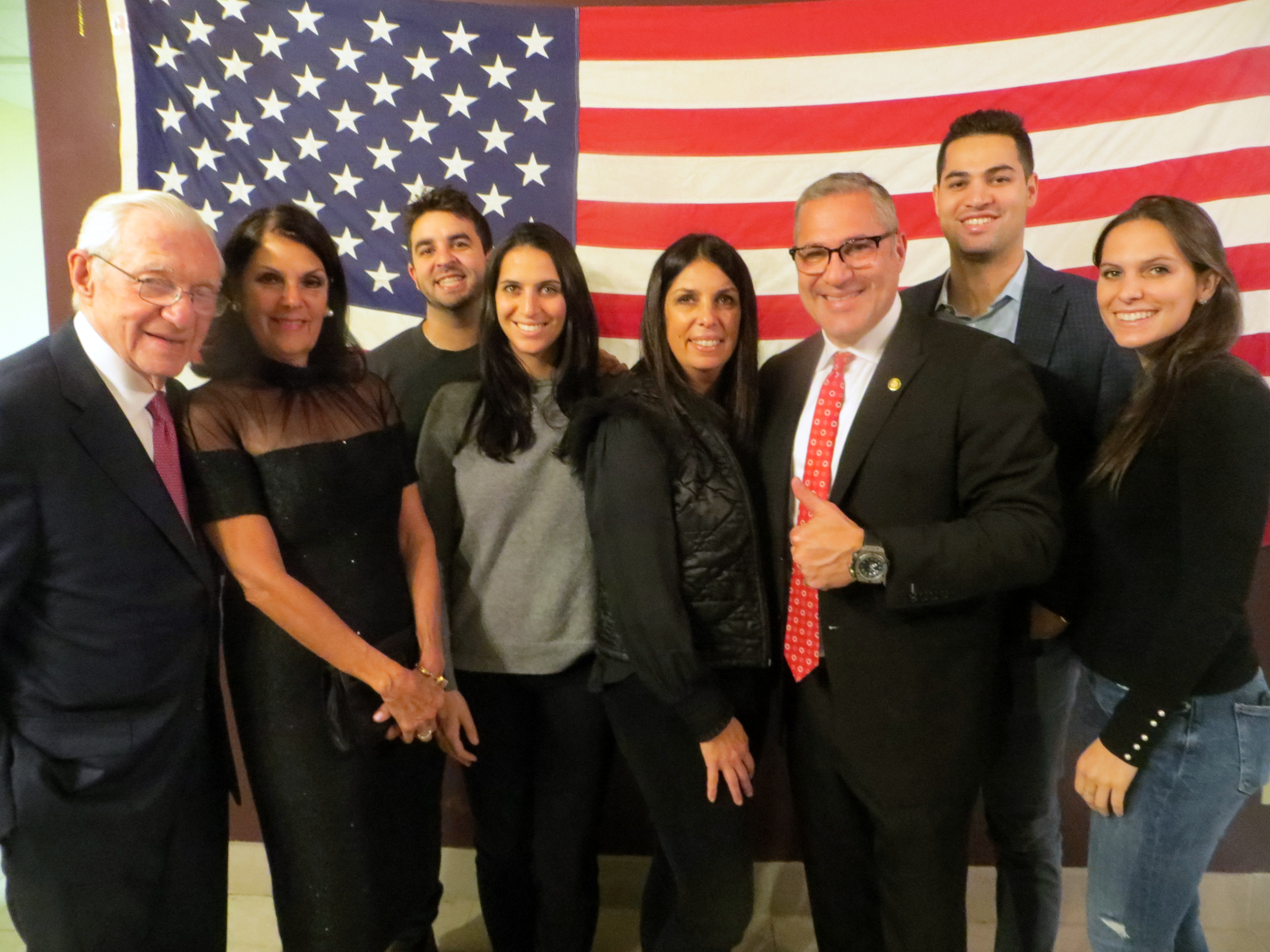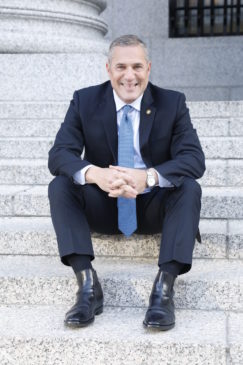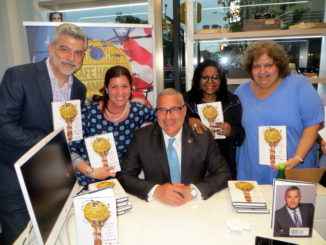
[slideshow_deploy id=’899′]
BY HILLARY VIDERS
SPECIAL TO NORTHERN VALLEY PRESS
ENGLEWOOD, N.J.—Michael Wildes Esq. was just elected as mayor of Englewood in a landslide victory. He previously served as the city’s mayor from 2004 and 2009.
Wildes is the managing partner with the leading immigration law firm of Wildes and Weinberg, P.C., which specializes in the practice of U.S. immigration and nationality law, including employment and investment-based immigration, work permits, permanent residence for qualified individuals, family-based immigration, asylum applications and all temporary and permanent-type visas.
Wildes also serves as counsel to several international corporate law firms, is “Of Counsel” to Lincoln Center and Yeshiva University, and is an adjunct professor at the Benjamin N. Cardozo School of Law in New York, where he teaches Business Immigration Law.
Wildes is a former federal prosecutor with the United States Attorney’s Office in Brooklyn (1989-1993) and author of “Safe Haven in America: Battles to Open the Golden Door” with a foreword by Alan Dershowitz.
Having represented the United States government in immigration proceedings, Wildes is a frequent participant on professional panels and a commentator on network television and radio with regard to corporate immigration law, employer sanction work and compliance. He has testified on Capitol Hill in connection with anti-terrorism legislation and is internationally renowned for his successful representation of distinguished celebrities, performing artists, actors and athletes, etc. Recent clients include First Lady Melania Trump, famed artists Sarah Brightman, Lionel Richie, Boy George, many of the former Miss Universes as well as soccer icon Pele and master Chef Jean-Georges.
Wildes’ father, who founded the family practice in 1960, successfully represented John Lennon in his widely publicized deportation proceedings, the circumstances of which have inspired several films, documentaries, and a recent book for which Wildes wrote the foreword.
Wildes is also deeply involved in civic service. He is a member of the Board of Directors of the international organization Boys Town Jerusalem, and the board of WhyHunger In New York. He is a certified EMT and member of the Hatzoloh, the largest ambulance service in the U.S. As such, all of his cars are outfitted with lights and sirens and medical equipment. He proudly acknowledges saving many lives and delivering two babies.
Hillary Viders: First, congratulations on your successful election, and on your third term as mayor of Englewood! You have a unique perspective in Englewood as both a longtime resident and an elected official. What made you decide to live here?
Michael Wildes: I moved to Englewood in 1995, five years after my wife, Amy, and I were married. We were negotiating where we were going to live, and she won the bet! We raised our four beautiful children in the city of Englewood, and I have loved living here for many reasons, such as the beautiful trees and cityscapes and the diversity of the people.
In my first term as mayor, when I conducted Sabbath dinners at my table, my kids would see people from all walks of life welcomed into our home. That’s a gift that this city has given me and for which I am ever grateful.

I am currently helping a Polish woman get her green card. She is married to a man from Lebanon that she met on social media and now they are excited about raising their children here. Where else do you find such wonderful diversity?
HV: How will you approach your position as Englewood’s mayor today, in 2018, compared to that of 2003 and 2006?
MW: As they say, “I’m older and wiser.” I am better informed now and better prepared because of the experiences that I have had locally and professionally. I am also humbled by the overwhelming support that I have had in this election and I consider that a mandate to get things done.
HV: What things do you plan to do differently this time around?
MW: First and foremost, I will work to achieve a community center. I will also deal with the infrastructure needs of the city and the renewal of the energy that made Englewood such a vibrant community. That includes overseeing the support that the central business district and the school system need.
HV: How will you go about achieving these objectives?
MW: I will roll up my sleeves and get to work! I learned from having served two terms on the City Council and two terms as mayor that you have to govern in the best tradition, which means getting along with people that you may not have agreed with and people who did not support you. It means giving a listening ear to all corridors at all times, to both young and old, and making sure that the city boards that I appoint are composed of good, transparent citizens who have the same vision of getting things done.
Englewood is now open for business, and for that business to succeed, we have to let people know that they can afford to live and raise their family here.
HV: How has your law background enhanced your skills as mayor?
MW: Thankfully, my law skills were already in place the last time I was mayor, but now I feel that my work as a parent and a husband have improved my skills for this go-round. As a lawyer who has been sworn to uphold the law and to advocate for scores of people from all walks of life heralding from all over the world, I am up to the challenge. If you can make it in Englewood, you can make it anywhere!
HV: Since your specialty is immigration law, how do you feel about the growing number of immigrants from El Salvador, Honduras and Guatemala seeking asylum in the U.S.?
MW: Historically, when people knock on our doors, America has been a safe haven for those in need. If immigrants from Central American countries have a credible fear of going home and if they do not present an imminent danger, we must be compassionate. Not every person with an accent is a member of MS13. If people knock legally and respectfully at our door, that golden door needs to be opened.
HV: Your client list includes many famous people. Is it easier for celebrities to obtain citizenship than ordinary people?
MW: No. One of the greatest experiences for me to see is that everyone has the same red blood and everyone has to wait the same time. It’s as rewarding for me to see a housekeeper get a green card as it was for the parents of our first lady to get their green cards. Melania Trump’s parents waited in the same line and were asked the same questions that all of my clients are asked.
HV: You have testified on Capitol Hill for anti-terrorism legislation. Can you give us an example of an important bill for which you advocated?
MW: After the first attack on the World Trade Center in 1993, I was concerned that our immigration laws were not effective in vetting individuals and that Congress should have been made aware of the fact that some visas were being hijacked. Unfortunately, Congress did not heed the call, but after 9/11, they went much further than I had suggested.
HV: There is currently a lot of attention on the U.S. Supreme Court. Hypothetically speaking, if you were a judge on the Supreme Court, what law would you most like to see challenged?
MW: I am opposed to the practice of not allowing immigration attorneys the right to enter an American embassy to help an alien who wants to come to the United States. An immigrant’s right to counsel does not exist until he or she comes to America’s shores. Right now, American embassies abroad deny aliens legal representation by American immigration lawyers.
HV: As a professor at Cardozo School of Law in New York City, you influence many young people who will become future lawyers and judges. What is the most valuable piece of advice that you give them?
MW: I tell them, “Develop a love for and pride in what you do and develop a relationship with every client, so that the file in front of you is not paper, but rather that person’s journey.”
I demonstrate this by having my students come to my office and observe how I deal with clients. I emphasize that this work ethic not only makes you a better lawyer, but also a better American and a better person.
HV: What is the most valuable advice that anyone has given you that will guide you as Mayor of Englewood?
MW: “Work it until it gets done!”

